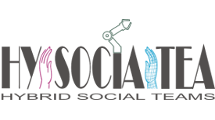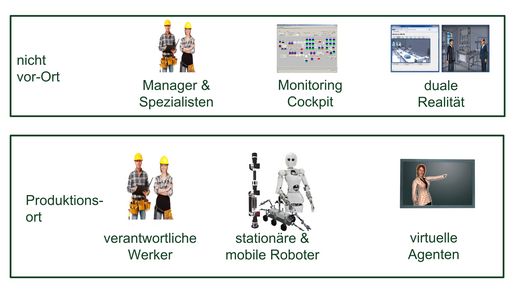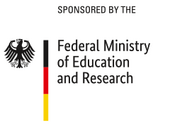The project HySociaTea (Hybrid Social Teams for Long-Term Collaboration in Cyber-Physical Environments), which is funded by the German Federal Ministry of Education and Research, realizes and examines the collaboration of technological augmented humans with autonomous robots, virtual characters and softbots, who work together in a team to solve common tasks.
In the context of Industry 4.0, an example application for these hybrid social teams is the realization of a highly flexible production, in which the team can react on unplanned events by autonomous reorganization. Besides research on the technical feasibility, another key aspect of the project lies in the development of robotic team-competencies as well as on intelligent multi-agent behavior, both of which are also important aspects in purely human teams. The technical systems developed in HySociaTea are mainly meant to be used as assistance-systems for humans working in production-plants – the robots should therefore be perceived as partners in the overall working-process.
On the long run, the team organization, as developed and examined in HySociaTea, can be used in different real-world scenarios, e.g. in modularized production facilities in the factory of the future, as rescue teams in emergency situations, or to realize the necessary division of labor between humans and machines to safely deconstruct nuclear power plants.
In order to realize the vision of HySociaTea, different research departments from all DFKI locations (Bremen, Kaiserslautern, Saarbrücken) join their competencies:
- RIC (Robotics Innovations Center, DFKI Bremen): autonomous and cooperative robotic systems, mobile manipulation
- CPS (Cyber-Physical Systems, DFKI Bremen): safe human-robot interaction
- EI (Embedded Intelligence, DFKI Kaiserslautern): augmented humans, wearable sensors
- AV (Augmented Vision, DFKI Kaiserslautern): perception modules using image processing and sensor fusion
- KM (Knowledge Management, DFKI Kaiserslautern): gaze-controlled perception recognition, real-time object-recognition
- IUI (Intelligent User Interfaces, DFKI Saarbrücken): emosocial virtual characters, multimodal dialog platform
- LT (Language Technology Lab, DFKI Saarbrücken): autonomous team-reorganization, natural speech interaction
- ASR (Agents and Simulated Reality, DFKI Saarbrücken): communication middleware, Dual Reality



